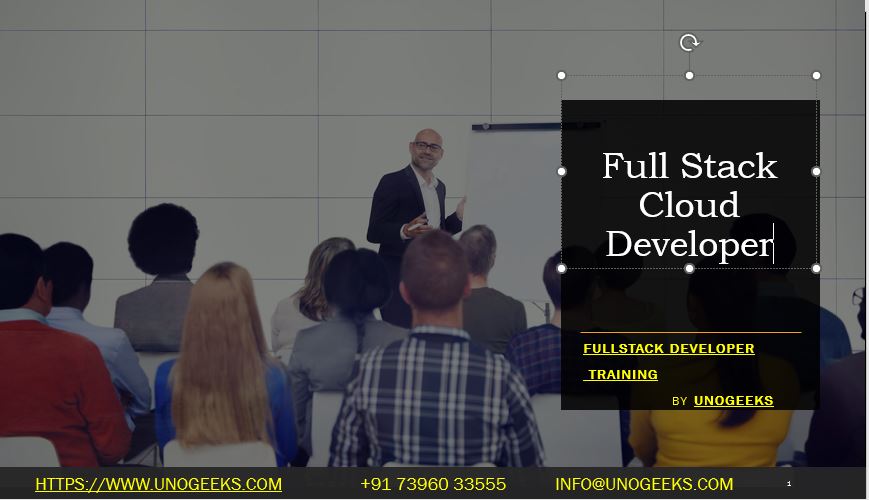Full Stack Cloud Developer
Full Stack Cloud Developer
A Full Stack Cloud Developer is a skilled professional who possesses expertise in both front-end and back-end development and has a strong understanding of cloud computing technologies. This role combines the responsibilities of a full-stack developer with the ability to design, develop, and deploy cloud-based applications and services. Here are the key aspects of a Full Stack Cloud Developer:
- Full Stack Development:
- Proficiency in front-end technologies such as HTML, CSS, JavaScript, and front-end frameworks (e.g., React, Angular, Vue.js).
- Back-end development skills using programming languages (e.g., JavaScript/Node.js, Python, Ruby, Java) and relevant frameworks (e.g., Express.js, Django, Ruby on Rails).
- Database Management:
- Expertise in working with both relational databases (e.g., MySQL, PostgreSQL) and NoSQL databases (e.g., MongoDB, Cassandra) for data storage and retrieval.
- Cloud Computing Knowledge:
- Understanding of cloud computing platforms such as Amazon Web Services (AWS), Microsoft Azure, Google Cloud Platform (GCP), or other cloud providers.
- Serverless Architecture:
- Proficiency in serverless computing and the use of serverless frameworks like AWS Lambda, Azure Functions, or Google Cloud Functions.
- API Development:
- Creation and management of APIs (Application Programming Interfaces) to facilitate communication between different components of cloud-based applications.
- Microservices Architecture:
- Knowledge of microservices architecture principles and experience in building scalable and modular applications using microservices.
- Cloud Deployment and DevOps:
- Deployment of applications and services on cloud platforms, including the use of infrastructure-as-code (IaC) tools like AWS CloudFormation or Terraform.
- Familiarity with DevOps practices for continuous integration and continuous deployment (CI/CD) pipelines.
- Scalability and Performance Optimization:
- Designing applications to be scalable and optimizing their performance to handle varying levels of traffic and load.
- Cloud Security:
- Implementing security best practices in cloud-based applications, including access control, encryption, and compliance with security standards.
- Monitoring and Logging:
- Setting up monitoring and logging solutions to track the health, performance, and security of cloud-based applications.
- Containerization and Orchestration:
- Experience with containerization technologies like Docker and container orchestration platforms such as Kubernetes for managing containerized applications.
- Serverless Functions:
- Development of serverless functions and event-driven architectures using cloud provider-specific services (e.g., AWS Lambda, Azure Functions).
- Data Storage and Analytics:
- Integration with cloud-based data storage solutions (e.g., Amazon S3, Azure Blob Storage) and data analytics tools (e.g., AWS Redshift, Google BigQuery).
- Cost Management:
- Ability to manage and optimize cloud infrastructure costs by selecting the right services and resources for the application’s needs.
- Cross-Functional Collaboration:
- Collaboration with cross-functional teams, including front-end developers, designers, and DevOps engineers, to deliver end-to-end solutions.
- Documentation and Communication:
- Providing documentation for cloud architecture, deployment processes, and best practices.
- Effective communication with team members and stakeholders.
Full Stack Cloud Developers play a critical role in modern software development, as they bridge the gap between traditional full-stack development and cloud-based solutions. They are capable of designing, developing, and deploying cloud-native applications that are scalable, reliable, and cost-efficient, making them valuable assets in today’s technology-driven landscape.
Full Stack Developer Training Demo Day 1 Video:
Conclusion:
Unogeeks is the No.1 IT Training Institute for Full Stack Developer Training. Anyone Disagree? Please drop in a comment
You can check out our other latest blogs on Full Stack Developer Training here – Full Stack Developer Blogs
Please check out our Best In Class Full Stack Developer Training Details here – Full Stack Developer Training

———————————-
For Training inquiries:
Call/Whatsapp: +91 73960 33555
Mail us at: info@unogeeks.com
Our Website ➜ https://unogeeks.com
Follow us:
Instagram: https://www.instagram.com/unogeeks
Facebook:https://www.facebook.com/UnogeeksSoftwareTrainingInstitute
Twitter: https://twitter.com/unogeeks
Conclusion:
Unogeeks is the No.1 Training Institute for Tableau Training. Anyone Disagree? Please drop in a comment
You can check out our other latest blogs on Tableau Training here – Tableau Blogs
You can check out our Best in Class Tableau Training details here – Tableau Training
Follow & Connect with us:
———————————-
For Training inquiries:
Call/Whatsapp: +91 73960 33555
Mail us at: info@unogeeks.com
Our Website ➜ https://unogeeks.com
Follow us:
Instagram: https://www.instagram.com/unogeeks
Facebook: https://www.facebook.com/UnogeeksSoftwareTrainingInstitute
Twitter: https://twitter.com/unogeeks
